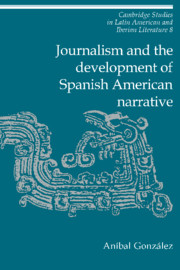Book contents
- Frontmatter
- Contents
- Acknowledgments
- 1 Journalism, modernity, and narrative fiction in Spanish America
- 2 Journalism and (dis)simulation in El Periquillo Sarniento
- 3 Sarmiento and sensationalist journalism: Facundo as crime story
- 4 Journalism versus genealogy: Ricardo Palma's Tradiciones peruanas
- 5 Journalism and the self: the Modernist chronicles
- 6 Journalism and the ethics of writing: Borges, García Márquez, Vargas Llosa, Poniatowska
- Notes
- Bibliography of works cited
- Index
1 - Journalism, modernity, and narrative fiction in Spanish America
Published online by Cambridge University Press: 08 October 2009
- Frontmatter
- Contents
- Acknowledgments
- 1 Journalism, modernity, and narrative fiction in Spanish America
- 2 Journalism and (dis)simulation in El Periquillo Sarniento
- 3 Sarmiento and sensationalist journalism: Facundo as crime story
- 4 Journalism versus genealogy: Ricardo Palma's Tradiciones peruanas
- 5 Journalism and the self: the Modernist chronicles
- 6 Journalism and the ethics of writing: Borges, García Márquez, Vargas Llosa, Poniatowska
- Notes
- Bibliography of works cited
- Index
Summary
We are more concerned … with the question of whether a history of an entity as self-contradictory as literature is conceivable. In the present state of literary studies this possibility is far from being clearly established. It is generally admitted that a positivistic history of literature treating it as if it were a collection of empirical data, can only be a history of what literature is not. … On the other hand, the intrinsic interpretation of literature claims to be anti- or ahistorical, but often presupposes a notion of history of which the critic is not himself aware.
Paul de Man, “Literary History and Literary Modernity”Which of us is writing this page I don't know.
Jorge Luis Borges, “Borges and I”In the heady days of the student protests that led to the massacre at Tiananmen Square in China in 1989, a telling indication of how much circumstances seemed to be changing in the direction the student leaders wanted was the sudden lifting of curbs on the press, as Chinese print and electronic journalists were for the first time able to report with considerable freedom on the social upheaval. Such freedom was promptly crushed, as was the student uprising, but its brief flowering, in the midst of a student-led rebellion demanding that China's modernization be sociopolitical as well as economic, served as a reminder of journalism's deep and perennial link to modernity.
- Type
- Chapter
- Information
- Publisher: Cambridge University PressPrint publication year: 1993



